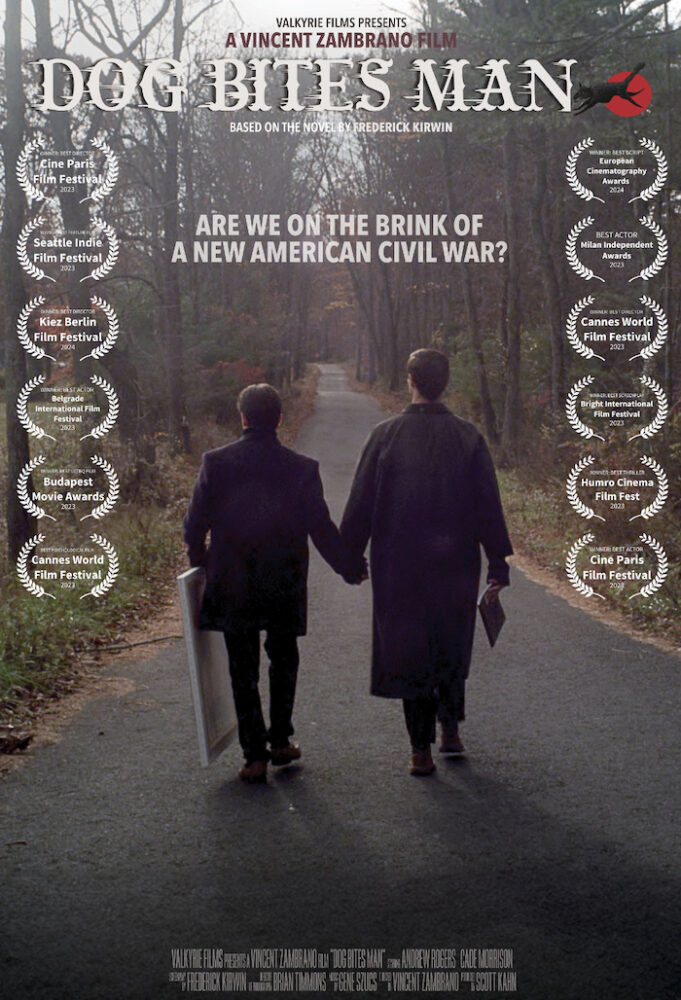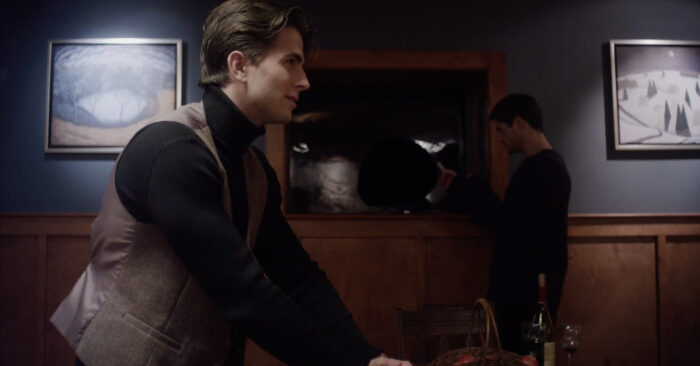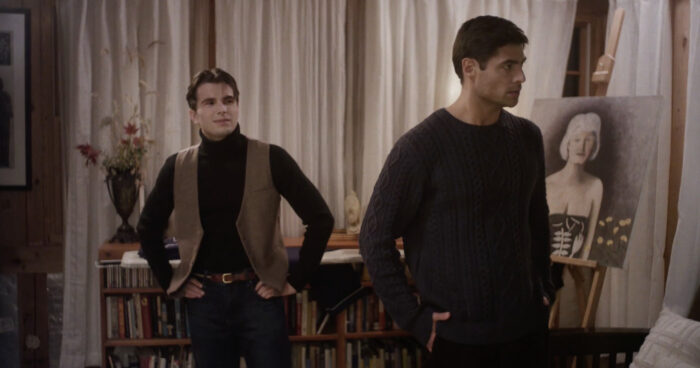
Dog Bites Man is a creative and intelligent surreal visionary film by Vincent Zambrano with outstanding performances by Andrew Rogers and Cade Morrison. It presents the convolution of paranoia, fear, and vulnerability throughout a suspenseful and eventful night in a cozy-looking suburban cabin. The movie is adapted from Frederick Kirwin’s 2019 novel, which bears the same title. According to the movie’s website, the book was inspired by the author’s experience of being harassed by a dog while on a stroll with his partner. It is directed by Vincent Zambrano and produced by Scott Kahn, whose paintings appeared in the movie as part of the set.
The movie starts with Evo (Cade Morrison) indignantly hitting the unresponsive landline. Meanwhile, a rock smashes through the kitchen window next to which Darm (Andrew Rogers) is sitting. As the two protagonists go out to the front yard to identify the culprit, they are terrified to find their car tires flattened; a belligerent German shepherd who attacked Evo earlier in the day is barking unrelentingly at them. As the dog warden and town sheriff do not show up during the day as promised, the frightened lovers, who, at the beginning of the movie, would discreetly address each other as “my friend,” are led to suspect that the dog owner is the scheming mastermind behind the series of mishaps, which are a prank at best and an assassination attempt at worst.


As anxiety and tension grow, the line between the real and the imaginary becomes blurred. The cabin’s electricity goes off, leaving Evo practically paralyzed by fear. The two devise a plan to escape to town, but electricity comes back on before they can leave the cabin. Is this an intimidation tactic? Or is it just an unforeseen electrical shortage? The protagonists constantly grapple with what is happening and what could have been the worst-case scenario. At one point, Evo goes from suspecting that there is a human body hanging from the tree to arguing that the dog owner had killed and hung the sheriff. Evo and Darm’s night of unfruitful attempts to validate reality feels like a fever dream. The couple’s frustration translates to a sense of general aggression directed at the mysterious dog owner and each other. They swear at the dog owner and immediately wonder if their volume might lead to more retribution; they bicker over frozen yogurt and ice cream and ask each other ruminating, repetitive questions. The dialogue format makes the movie entertaining to watch despite the emotional tension that is sometimes hard to digest.

The movie is witty yet profound in many ways. For instance, the name of the cabin’s owner, Blanca DuBois, is highly reminiscent of the character Blanche DuBois from Tennessee Williams’ play, A Streetcar Named Desire. In the play, Blanche’s husband died by suicide after she found out about and mocked his homosexuality. Her famous line at the end of the play, “Whoever you are – I have always depended on the kindness of strangers,” bears an ironic thematic echo to this movie’s central metaphor of the “new American Civil War.” Throughout the film, peace seems impossible to sustain due to constant perturbance and the perceived malignancy of strangers in an unfamiliar setting. Dichotomies such as urban vs. suburban and cultured vs. coarse intensify narratives of otherness and danger, as the couple feels targeted and aggressive. At 00:17:27, a light bicker takes place between Evo and Darm:
“EVO: How do we always get into situations like this?
DARM: It’s the way you walk.
EVO: The way I what?
DARM: Walk. It’s furtive.”
While it is uncertain in which year the movie is set, there seems to be an implicit commentary about how societal stigmas against homosexuality—manifest in the form of microaggressions—can affect people’s understanding of self.
Scott Kahn said in an interview, “It’s not a realistic story…it transcends any real-life experience.” Yet, the movie’s emotional subtext is highly relatable to contemporary life and politics, prompting us to think about the preconceptions, misconceptions, and relationships that shape us and society.

